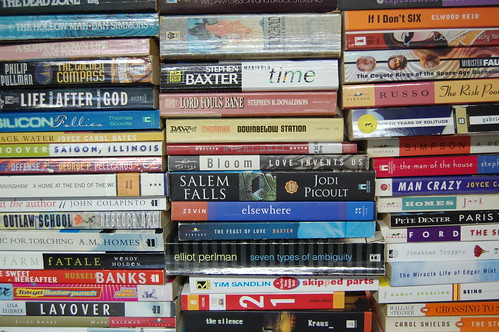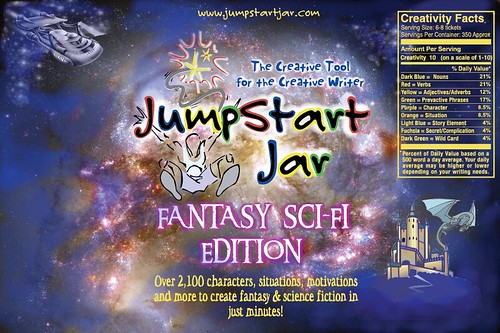 Don't get me wrong. I'm not saying if a book doesn't make it past the first round that it isn't a good book. That might be the case, but a publisher somewhere decided to take a chance on it, so it probably isn't too bad... It just might not be the book for me... and some of these books have been sitting on my bookshelf for almost 20 years. Either I'm going to read it soon, or not at all... and if I'm not going to read it, I need to pass these books on. They've been here too long.
Don't get me wrong. I'm not saying if a book doesn't make it past the first round that it isn't a good book. That might be the case, but a publisher somewhere decided to take a chance on it, so it probably isn't too bad... It just might not be the book for me... and some of these books have been sitting on my bookshelf for almost 20 years. Either I'm going to read it soon, or not at all... and if I'm not going to read it, I need to pass these books on. They've been here too long.Here are the criteria that I'm using to determine if a book goes on to the second round:
- Whether the first five pages grab and hold my attention making me interested in continuing to read the book.
- The summary on the back of the book.
- The blurbs and critical acclaim on the inside of the book.
- The design of the book cover. You all know that you do it... such a cliche, but we do all judge a book by its cover.
- The author's name and reputation. This might not seem fair, but all publishers (and most readers too) evaluate the writer's name recognition, sales of past books, awards won, and respect of their peers.
Without further ado, here is the list of 64 books:
- The Coyote Kings of the Space Age Bachelor Pad – Minister Faust (2004)
- The Risk Pool – Richard Russo (1986)
- 100 Years of Solitude – Gabriela Garcia Marquez (1992)
- @expectations – Kit Reed (2000)
- If I Don't Six – Elwood Reid (1998)
- LA Woman – Cathy Yardley (2002)
- Lonesome Dove – Larry McMurtry (1985)
- Freezing – Penelope Evans (1997)
- A Slipping Down Life – and Tyler (1970)
- The Outlaws of Sherwood – Robin McKinley (1988)
- The Businessmen – Thomas M. Disch (1984)
- The Dead Zone – Stephen King (1979)
- The Hollow Man – Dan Simmons (1992)
- The Golden Compass – Philip Pullman (1995)
- Life After God – Douglas Copeland (1994)
- Silicon Follies – Thomas Scoville (2001)
- Black Water – Joyce Carol Oates (1992)
- Saigon, Illinois – Paul Hoover (1988)
- A Firing Offense – George P. Pellicano's (1992)
- A Home at the End of the World – Michael Cunningham (1990)
- About the Author – John Colapinto (2001)
- Outlaw School – Rebecca Ore (2000)
- Music for Torching – A.M. Homes (1999)
- Farm Fatale – Wendy Holden (2001)
- The Sweet Hereafter – Russell Banks (1991)
- Tokyo Sucker Punch – Isaac Adamson (2000)
- Layover - Lisa Zeidner (1999)
- Lying Awake – Mark Salzman (2000)
- A Bigamist's Daughter – Alice McDermott (1982)
- Treason – Orson Scott card (1979)
- The Grid – Philip Kerr (1995)
- The Difference Engine – William Gibson and Bruce sterling (1991)
- Stronghold: Dragonstar Book 1 – Melanie Rawn (1990)
- Manifold Time – Stephen Baxter (2000)
- Lord Foul's Bane – Stephen R Donaldson (1977)
- Downbelow Station – C. J. Cherryh (1981)
- Night Duty – Melitta Breznik (1999)
- Love Invents Us – Amy Bloom (1997)
- Salem Falls – Jodi Picoult (2001)
- elsewhere – Gabrielle Zevon (2005)
- The Feast of Love – Charles Baxter (2000)
- Seven Types of Ambiguity – Elliot Perlman (2003)
- Skipped Parts – Tim Sandlin (1991)
- 21 – Jeremy Iversen (2005)
- The Silence – Jim Krause (2004)
- A Regular Guy – Mona Simpson (1996)
- The Man of the House – Stephen McCauley (1996)
- Man Crazy – Joyce Carol Oates (1997)
- Jack – A.M. Homes (1989)
- Paris Trout – Pete Dexter (1988)
- The Sportswriter – Richard Ford (1986)
- The Book of Joe – Jonathan Tropper (2004)
- The Miracle Life of Edgar Mint – Brady Udall (2001)
- Being Alexander – Nancy Sparling (2002)
- Crossing to Safety – Wallace Stegner (1987)
- The Stone Diaries – Carol Shields (1993)
- The Love Letter – Cathleen Schine (1995)
- Ceremony – Leslie Marmon Silko (1977)
- The God of Small Things – Arundhati Roy (1997)
- John Henry Days – Colson Whitehead (2001)
- Vicious Spring – Hollis Hampton Jones (2003)
- Geek Love – Katherine Dunn (1983)
- Strawberry Tattoo – Lauren Henderson (1999)
- Turn-of-the-Century – Kurt Anderson (1999)

